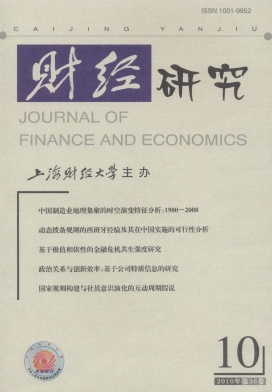开源经济的现代价值分析
财经研究 2010 年 第 36 卷第 10 期, 页码:113 - 122
摘要
参考文献
摘要
开源经济是基于开源软件基础上发展起来的一种新的生产方式,它之所以受到学界的关注是因为开源经济对现有的西方经济学理论提出了严峻的挑战:参与者"利己"与"利他"双重行为倾向违背了西方经济学的"经济人"假设;开源经济的生产组织方式和治理机制相比传统企业制度在某些方面表现出显著的高效性;开源软件生产克服了公共物品供给的难题等。但是,开源经济与马克思主义的社会主义经济学却具有很强的一致性。开源经济的研究对于在现时检验和发展马克思主义经济学具有重要的理论价值。
[1]马艳.基于马克思经济学逻辑的相对理性经济人假设[J].当代经济研究,2007,(10):23-28.
[2]程恩富.新“经济人”论:海派经济学的一个基本假设[J].教学与研究,2003,(11):22-26.
[3]马艳,郭白滢.开源经济学的形成与发展[J].经济学动态,2010,(5):102-104.
[4]Benkler,Yochai.Coase’s penguin,or Linux and the nature of the firm[J].Yale LawJournal,2003,112:371-444.
[5]Bitzer J,P Schr der.The impact of entry and competition by open source software oninnovation activity[A].Bitzer J.P Sohr der.The economics of open source software de-velopment[C].Amsterdam:Elsevier,2006:219-246.
[6]Hars A,Ou S.Working for free?Motivations of participating in open source projects[J].International Journal of Electronic Commerce,2000,6(3):25-39.
[7]Lerner J,J Tirole.Some simple economics of open source[J].Journal of IndustrialEconomic,2002,52:197-234.
[8]Paul B de Laat.Governance of open source software:State of the art[J].Journal ofManagement and Governance,2007,(6):165-177.
[9]Raymond E S.The cathedral and the bazaar[M].Reilly,Sebastopol,CA,1999.
[10]Rossi.Decoding the free’open source software puzzle:A survey of theoretical and em-pirical contributions[J].Quaderni dell’Istituto di Economia,2004,424:1-40.
[11]Torvalds L,Diamond D.Just for fun:The story of an accidental revolutionary[M].New York:Harper Business,2001.
[12]Von Hippel,Von Krogh.The private-collective innovation model in open source soft-ware development:Issues for organization science[J].Organization Science,2003,14(2):209-223.
[13]Von Krogh,Von Hippel E.The promise of research on open source software[J].Management Science,2006,52(7):975-983.
②⑤马克思、恩格斯:马克思恩格斯选集(第1卷),人民出版社1995年版,第294页、第86页。
③④⑥马克思、恩格斯:马克思恩格斯选集(第3卷),人民出版社1995年版,第759-760页、第759-760页,第630-633页。
⑦开源经济参与者的动机可以分为两类:内在动机,即参与者的一种自我心理满足,外在动机,即参与者获得外在经济回报,以上是个人的动机,企业或其他组织出于市场需求,也会参与到开源经济(马艳、郭白滢,2010)。
[2]程恩富.新“经济人”论:海派经济学的一个基本假设[J].教学与研究,2003,(11):22-26.
[3]马艳,郭白滢.开源经济学的形成与发展[J].经济学动态,2010,(5):102-104.
[4]Benkler,Yochai.Coase’s penguin,or Linux and the nature of the firm[J].Yale LawJournal,2003,112:371-444.
[5]Bitzer J,P Schr der.The impact of entry and competition by open source software oninnovation activity[A].Bitzer J.P Sohr der.The economics of open source software de-velopment[C].Amsterdam:Elsevier,2006:219-246.
[6]Hars A,Ou S.Working for free?Motivations of participating in open source projects[J].International Journal of Electronic Commerce,2000,6(3):25-39.
[7]Lerner J,J Tirole.Some simple economics of open source[J].Journal of IndustrialEconomic,2002,52:197-234.
[8]Paul B de Laat.Governance of open source software:State of the art[J].Journal ofManagement and Governance,2007,(6):165-177.
[9]Raymond E S.The cathedral and the bazaar[M].Reilly,Sebastopol,CA,1999.
[10]Rossi.Decoding the free’open source software puzzle:A survey of theoretical and em-pirical contributions[J].Quaderni dell’Istituto di Economia,2004,424:1-40.
[11]Torvalds L,Diamond D.Just for fun:The story of an accidental revolutionary[M].New York:Harper Business,2001.
[12]Von Hippel,Von Krogh.The private-collective innovation model in open source soft-ware development:Issues for organization science[J].Organization Science,2003,14(2):209-223.
[13]Von Krogh,Von Hippel E.The promise of research on open source software[J].Management Science,2006,52(7):975-983.
②⑤马克思、恩格斯:马克思恩格斯选集(第1卷),人民出版社1995年版,第294页、第86页。
③④⑥马克思、恩格斯:马克思恩格斯选集(第3卷),人民出版社1995年版,第759-760页、第759-760页,第630-633页。
⑦开源经济参与者的动机可以分为两类:内在动机,即参与者的一种自我心理满足,外在动机,即参与者获得外在经济回报,以上是个人的动机,企业或其他组织出于市场需求,也会参与到开源经济(马艳、郭白滢,2010)。
引用本文
马艳, 郭白滢. 开源经济的现代价值分析[J]. 财经研究, 2010, 36(10): 113–122.
导出参考文献,格式为:
下一篇:家族权威的配置效应分析与实证检验





 6135
6135  3372
3372

